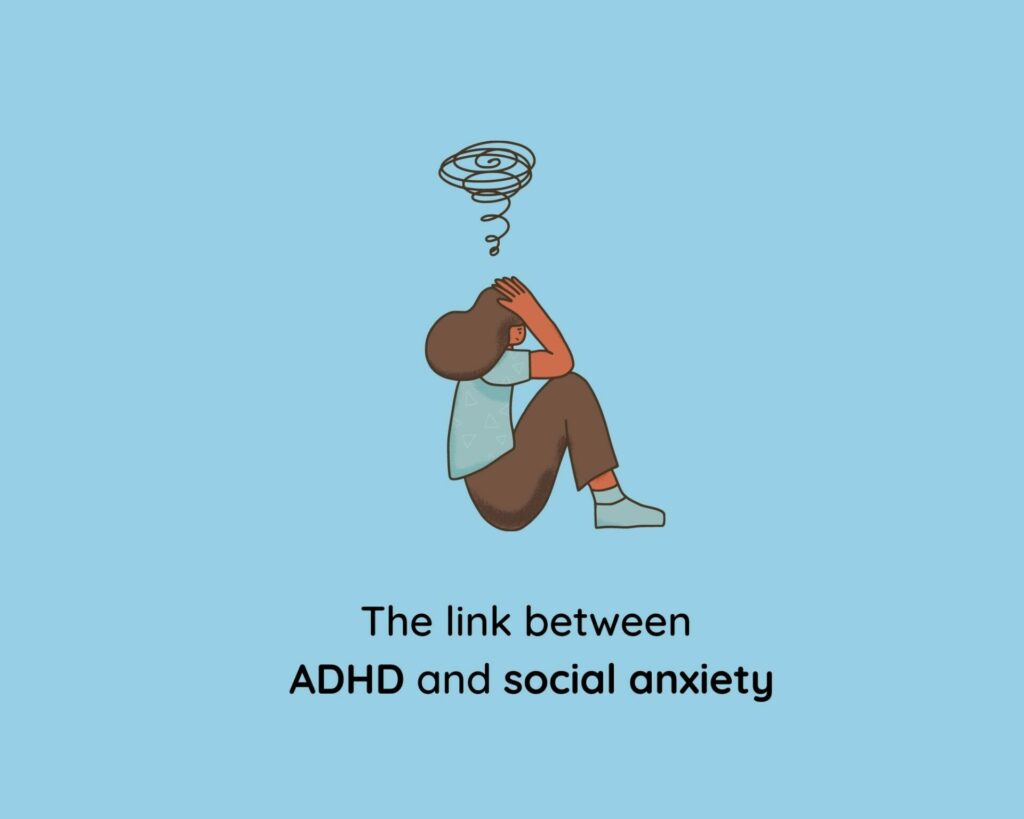It is no secret that ADHD and social anxiety often go hand in hand. In fact, a study published in the Journal of Attention Disorders found that nearly 60% of people with ADHD also have social anxiety. But what is not as well known is the way that these two conditions interact with each other. In this blog post, we will discuss the relationship between ADHD and social anxiety, and how they can affect each other.
Contents
What Is ADHD?
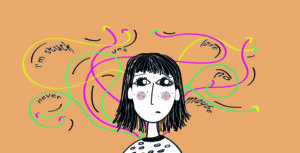 When we say ADHD, the first thought in our heads is that of a bouncing, fidgety child who can’t sit still in class. And while this is certainly one type of ADHD, it is not the only definition. Attention-deficit/hyperactivity disorder is a neurodevelopmental disorder that is characterized by problems with focus, hyperactivity, and impulsivity. It is often diagnosed in childhood, but it can also carry into adulthood. In fact, according to the National Institute of Mental Health, about 60% of children with ADHD will continue to experience symptoms into adulthood.
When we say ADHD, the first thought in our heads is that of a bouncing, fidgety child who can’t sit still in class. And while this is certainly one type of ADHD, it is not the only definition. Attention-deficit/hyperactivity disorder is a neurodevelopmental disorder that is characterized by problems with focus, hyperactivity, and impulsivity. It is often diagnosed in childhood, but it can also carry into adulthood. In fact, according to the National Institute of Mental Health, about 60% of children with ADHD will continue to experience symptoms into adulthood.
It is further of 3 types:
- Inattentive type: Formerly known as attention deficit disorder (ADD), this is characterized by problems with focus and concentration.
- Hyperactive-impulsive type: This is characterized by symptoms of hyperactivity and impulsivity.
- Combined type: This is the most common form of ADHD, and it is characterized by symptoms of both inattention and hyperactivity/impulsivity.
While the symptoms of ADHD can vary from person to person, they will typically fall into one of these three categories.
What Is Social Anxiety?
 You may see others or even yourself feel shy in a room full of strangers or feel anxious before giving a presentation, and chalk it up to being introverted or just having stage fright. However, social anxiety is much more than that. Social anxiety disorder is an intense fear of social situations that can interfere with work, school, and personal relationships. It is estimated that about 15 million adults in the world suffer from social anxiety disorder.
You may see others or even yourself feel shy in a room full of strangers or feel anxious before giving a presentation, and chalk it up to being introverted or just having stage fright. However, social anxiety is much more than that. Social anxiety disorder is an intense fear of social situations that can interfere with work, school, and personal relationships. It is estimated that about 15 million adults in the world suffer from social anxiety disorder.
While the symptoms of social anxiety can vary from person to person, they typically fall into one of these three categories:
- Performance Anxiety: This is when you experience anxiety about being in a situation where you will be judged, such as giving a presentation or taking a test.
- Interaction Anxiety: This is when you experience anxiety about interacting with other people, such as attending a party or going on a date.
- Observation Anxiety: This is when you experience anxiety about being observed by others, such as eating in public or using a public restroom.
All these types of anxiety can be extremely crippling and make it hard to function in day-to-day life.
What Is The Link Between The Two?
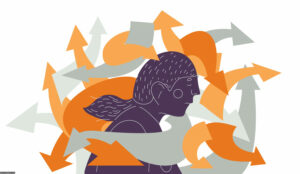 Now that we know more about ADHD and social anxiety, let’s talk about the link between the two. It is not fully known why ADHD and social anxiety so often go hand-in-hand, but there are a few theories.
Now that we know more about ADHD and social anxiety, let’s talk about the link between the two. It is not fully known why ADHD and social anxiety so often go hand-in-hand, but there are a few theories.
- One theory is that it could be due to the fact that people with ADHD often have difficulty regulating their emotions. This can lead to feeling overwhelmed in social situations, which can then lead to social anxiety.
- The link between ADHD and social anxiety can further create a vicious cycle. People with ADHD may avoid social situations because of their social anxiety, which can then lead to more isolation and feelings of loneliness. This isolation can then exacerbate the symptoms of ADHD, creating a cycle that can be difficult to break out of.
- Another theory is that people with ADHD may be more sensitive to criticism and judgment from others. This can again lead to feeling anxious in social situations.
- Moreover, ADHD and social anxiety can both also be of genetic origin. If one or both of your parents suffer from social anxiety or ADHD, you’re at greater risk for developing either condition.
- This comorbidity can also develop from early life trauma or abuse. If you experienced bullying or social isolation as a child, you may be more likely to suffer from both social anxiety and ADHD as an adult.
Whatever the reason for the link between ADHD and social anxiety, it is clear that they often go hand-in-hand.
Now that we know the intangible relationship between these two disorders, we will now understand how ADHD and SAD are similar and also different.
Similarities
Both disorders fall parallel to one another in the following ways.
- Firstly, they are both types of anxiety. It can be evident that both ADHD and social anxiety are disorders that produce feelings of fear or apprehension.
- Secondly, they share common symptoms. As we saw earlier, both disorders have the potential to interfere with daily life.
- People who suffer from either ADHD or social anxiety may have difficulty concentration, sleeping, and maintaining relationships.
- Both these can also be a consequence of biological, environmental, or hormonal factors.
Differences
However, there are some significant differences between the two disorders as well.
- The most notable difference is that social anxiety only occurs in specific situations while ADHD symptoms can occur all the time.
- ADHD also tends to be diagnosed in childhood or early adolescence, while social anxiety disorder often develops in adulthood.
- Moreover, people with ADHD may be more likely to take risks, while people with social anxiety may tend to avoid situations that make them anxious.
- Another notable distinction is that people with social anxiety may be more aware of their anxiety than those with ADHD. This means that people with social anxiety may be more likely to seek out treatment than those with ADHD.
Can One Disorder Lead To The Other?
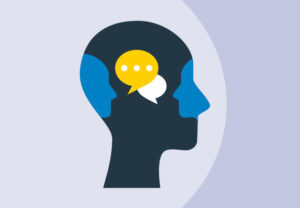 When we talk about two distinctively similar mental disorders, it often leads us to question which one came first.
When we talk about two distinctively similar mental disorders, it often leads us to question which one came first.
In the case of social anxiety and ADHD, it is hard to say which one may lead to the other.
There is no clear evidence to suggest that one disorder leads to the other. However, as we saw earlier, the two disorders often go hand-in-hand. This comorbidity may be due to genetic factors, early life experiences, or a combination of both.
Another essential factor is that ADHD is a neurological disorder while social anxiety is a psychological disorder. This means that the two disorders may share some common symptoms but are ultimately quite different.
The link between ADHD and social anxiety is still not fully understood. However, what we do know is that the two disorders often occur together. If you suffer from one, you may be at greater risk of developing the other.
How Do They Impact Life?
Anything that is preventing you from living your life to the fullest potential is considered an impairment.
This means that both ADHD and social anxiety can have a significant impact on your life.
ADHD can interfere with school, work, and relationships. Social anxiety can also make it difficult to maintain relationships, go to work, or even leave the house.
Social anxiety has similar repercussions. It is not uncommon for people with social anxiety to avoid social situations, which can lead to job loss, social isolation, and difficulty maintaining relationships.
The good news is that both of these disorders are treatable. With the help of a mental health professional, you can learn how to manage your symptoms and live a healthy life.
What Are The Treatment Options?
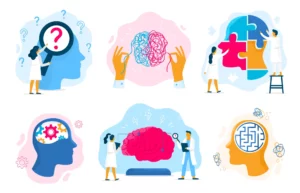 Although there is no permanent solution or cure to either social anxiety or ADHD, there are treatments that can help you manage your symptoms and live a normal life.
Although there is no permanent solution or cure to either social anxiety or ADHD, there are treatments that can help you manage your symptoms and live a normal life.
- The most common treatment for social anxiety is cognitive-behavioral therapy (CBT). This type of therapy helps you to understand and change the thoughts and behaviors that contribute to your anxiety. Exposure therapy is another common treatment that helps you to gradually confront the situations that make you anxious. There are also several medications that can be used to treat social anxiety, such as anti-anxiety medication and beta-blockers.
- ADHD is often treated with medication, such as stimulants or non-stimulants. These medications can help to improve focus, concentration, and impulsivity. CBT is also an effective treatment for ADHD. This type of therapy can help you to learn how to better manage your time, set goals, and stay organized. In some cases, a combination of medication and therapy may be the best option.
If you think you may suffer from social anxiety or ADHD, it is important to seek professional help. These disorders can have a significant impact on your life, but with treatment, you can learn how to manage your symptoms and live to the fullest.
Conclusion
In the end, we can conclude that both ADHD and social anxiety can have a negative impact on each other. If you suffer from one, it is likely that the other will affect you as well. However, treatment is available for both conditions. With the help of a professional, you can learn to manage your symptoms and live a happy, fulfilling life.
If you or someone you know is looking for psychological help, Therapy Mantra is here for you. We are the leading providers of online therapy and counseling. Our team of highly trained and experienced therapists can provide assistance at the most affordable rates. Contact us today to learn more about our services. You may also visit our website to book an online therapy session or download our free Android or iOS app for more information.
